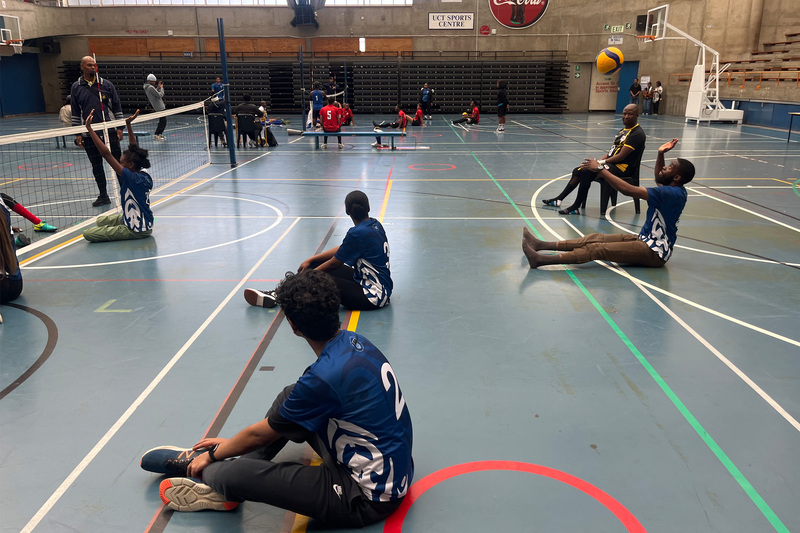Varsities clash in sitting volleyball
06 October 2025 | Story Myolisi Gophe.Photos Tulela Shatona. Read time 5 min.
It was all about championing inclusion, community, and the unifying power of sport when the University of Cape Town (UCT) recently partnered with the Cape Peninsula University of Technology (CPUT) and four provincial sitting volleyball clubs in a spirited tournament.
Organised by the UCT ParaSports Club, the event drew players with and without disabilities to the court, breaking down barriers and building new forms of understanding. For club founder, Dr Muya Koloko, this was the essence of the day.
“It was a really good day because we had people with and without disabilities interacting and playing together,” Dr Koloko said. “It helped to show that the sport is for everyone. And it also gave non-disabled players a fresh perspective, because they got to experience the game as players with disabilities do.”
Learning through play
Sitting volleyball, a fast-paced adaptation of the traditional game, requires athletes to remain seated on the court, relying heavily on upper body strength and quick reflexes to move and hit the ball. For those more familiar with standard volleyball, the shift is eye-opening.
“Players without disabilities really learned quite a bit,” Koloko explained. “They had to think more about what they were doing with their upper bodies, how to use their arms for placement, and how to move around the court differently. It’s a humbling experience.”
Koloko believes these moments of learning are just as important as the matches themselves. “It breaks down silos,” he said. “We don’t want a world where people with disabilities only play sitting volleyball, while those without disabilities stick to standing volleyball. Inclusion means sharing the court and the community.”
The tournament marked the second such inter-varsity sitting volleyball event this year, following a similar competition hosted by CPUT in April. Interest is spreading: the University of the Western Cape (UWC) has expressed eagerness to join future fixtures, and some of its students have already signed up with local clubs.
“Our goal has always been to make sure anyone who wants to participate in sport – whether it’s as a player, coach, spectator, or official – has a place with us.”
“The interest is growing at the various institutions,” Koloko said. “That’s exactly what we hoped for, because the more universities and communities that get involved, the stronger the sport becomes.”
For UCT, the ParaSports Club’s work speaks directly to the university’s Vision 2030 strategy, which emphasises inclusivity and transformation.
“When Vision 2030 highlighted inclusion – even if it didn’t specifically mention disability – we felt we were living that mission,” Koloko noted. “Our goal has always been to make sure anyone who wants to participate in sport – whether it’s as a player, coach, spectator, or official – has a place with us.”
The day wasn’t short of drama. An inter-university clash between UCT and CPUT had spectators on the edge of their seats. UCT surged to a two-set lead but ultimately fell as CPUT staged a remarkable comeback to win the five-set thriller.
The club final proved equally gripping. Ikapa Storm appeared to be cruising after a dominant first set, but reigning champions Thumamina rallied to claim victory, defending their crown in style.
Sport as heritage
The event was also timed to coincide with Heritage Month under the theme “Sport is our heritage”. For Koloko, this message carried special weight.
“If people with disabilities say sport is our heritage, some might question it,” he reflected. “But this tournament showed exactly why it is. Sport is for everyone, whether you have a disability or not. It’s our common ground.”
Among the new faces was Tulela Shatona, a Namibian . Initially drawn to campus disability services as a volunteer, Shatona stumbled upon parasport last year and has since become head of marketing for the ParaSports Club.
She had never played sitting volleyball before the tournament but found herself hooked.
“It was so cool,” she said, laughing. “These are players at the national level, and there I was just starting. But they were really encouraging and even gave me tips during the game.”
Her highlight of the tournament? Landing her first serve after struggling through earlier attempts. “When it went through, I was like, oh my goodness, that’s so cool!”
Beyond the fun, Shatona sees deeper value. “A lot of people don’t even know sitting volleyball exists, or that we have players in the Western Cape competing at the highest level nationally. We tend to focus on rugby or basketball, but parasport deserves recognition too. This tournament brought much-needed attention.”
Growing into a movement
The momentum isn’t slowing down. Next on the calendar are the National Club Championships in Stellenbosch from 7 to 9 November, alongside a ParaVolley South Africa coaching course earlier that month. Koloko hopes students will sign up to become coaches and help embed the sport more firmly in university life.
“We need everyone,” he said. “Players, officials, coaches, and spectators. This tournament showed what’s possible when people come together. And it can’t be a once-off moment. It has to grow into a movement.”
 This work is licensed under a Creative Commons Attribution-NoDerivatives 4.0 International License.
This work is licensed under a Creative Commons Attribution-NoDerivatives 4.0 International License.
Please view the republishing articles page for more information.




















